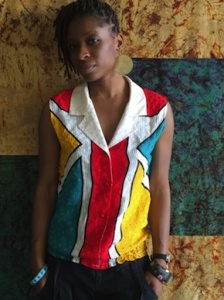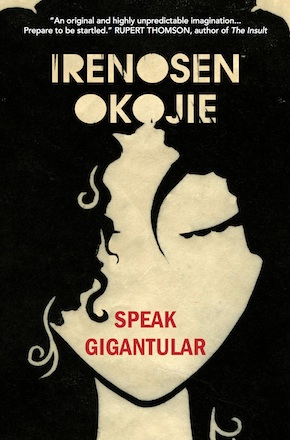Fearless flourish
by Musa OkwongaIrenosen Okojie is a remarkable writer. I discovered this late last year, when her second book Speak Gigantular, a collection of extraordinary short stories – was submitted by Jacaranda Books for the Jhalak Prize, a literary award for writers from ethnic minority backgrounds. As one of the judges, I would carry two or three books around town with me at once to get through the reading list as quickly as I could. There were so many superb entries, and I had a great deal to get through; yet I still found myself returning to Okojie’s work out of pleasure.
Okojie’s debut novel Butterfly Fish won a Betty Trask Award, and she seems equally at home with short-form fiction. Speak Gigantular felt not so much like reading a collection as listening to an album. It reminded me of the first time I heard two LPs I love above most others: Tame Impala’s Innerspeaker and Mos Def’s Black on Both Sides. Like Innerspeaker, a masterpiece of psychedelic rock, Okojie has created something truly ethereal and immersive. Like ‘Hip Hop’, Mos Def’s rousing opener on Black on Both Sides, Okojie’s book begins with a blistering statement of intent, a furious hymn to life:
“Your pity stinks. Stop cowering in the corner. Stop crawling naked on top of that wardrobe. You can’t reinvent yourself from contained heights… Darkness motivates men, mobilises armies. Use it. You are a warrior. Show me your roar. People are scared of your power, frightened of what you can do with it.”
Okojie then proceeds through a series of perfectly curated sections, throughout which she, like Mos Def, varies the mood and tempo with considerable skill. Her work has much of the same texture I found in David Mitchell’s Ghostwritten, an excellent novel which sees a series of narratives expertly intertwined.
One of the most striking features of Speak Gigantular is its ambition. Okojie is a brave writer, in both the subjects she addresses and the lack of mercy she shows her characters. She puts her protagonists in horrifying situations, and you share their despair when you realise they are not going to escape. This is not needless cruelty, it is a reminder that in real life the superhero does not come swooping from the heavens to save you. Time and again we meet people who deserve far better, but who the world finds one final way to leave devastated. There is the woman who suffered harrowing assault and, merely looking for love, is abducted by an alien. There is the girl with Down’s syndrome who is punished by a boy for an attraction he cannot embrace. There is the young boy in a small town who is born with an animal’s tail, and cannot find respite from his torment within his own home.
Okojie’s greatest ability as a writer is that she makes us see through the eyes of others. We may not always like what we find, but that makes this work all the more important.”
Yet Okojie is easily gifted enough to avoid writing a litany of stories that read like grim morality tales. Her prose has a playfulness, a certain lightness of touch, and she is not afraid of tender moments or happy endings. There is something noble and surprisingly beautiful about Pepe, the man who robs banks dressed as a chicken. Elsewhere, we are treated to an exhilarating holiday romance in Cape Verde, and a mermaid falling for an unsuspecting local man. Many of the people who populate her stories could find themselves as the main character of a novel, so well are they drawn. Moreover, Okojie moves so well between places and perspectives, taking us with equal smoothness through Portugal and to the bottom of a gnome’s garden, and into the friendship of two ghosts on the London Underground.
Perhaps Okojie’s greatest ability as a writer is that she makes us see through the eyes of others. We may not always like what we find, but that makes this work all the more important. In Vegas, the book’s closer, whose subject matter I will not reveal so as not to spoil the story, the two main characters are troubling but wholly compelling, and we gain a full understanding of why their dynamics develop as they do. Her choice to place this story last in the collection is testament to the fearlessness of her work. Speak Gigantular begins with a flourish and has a devastating finish. In fact, the narrative arc of this book reminds me of a comment by the poet Warsan Shire: “The first line of a poem should usher you in, a door half open, a warm glow, an empty seat. The last line should punch you in the stomach.”
Okojie has produced a piece of work that is complex, challenging, and endlessly beguiling. It tells us arresting things about the world and about ourselves, and the only thing more exciting than this collection is the thought of what she will write next.
 Irenosen Okojie is a writer, curator and Arts Project Manager. She has worked with the Royal Shakespeare Company, the Southbank Centre, and the Caine Prize. Her writing has been featured in the Guardian and the Observer and her short stories have been published internationally. Butterfly Fish and Speak Gigantular, which was shortlisted for the Jhalak Prize, are published by Jacaranda Books. Read more.
Irenosen Okojie is a writer, curator and Arts Project Manager. She has worked with the Royal Shakespeare Company, the Southbank Centre, and the Caine Prize. Her writing has been featured in the Guardian and the Observer and her short stories have been published internationally. Butterfly Fish and Speak Gigantular, which was shortlisted for the Jhalak Prize, are published by Jacaranda Books. Read more.
irenosenokojie.com
@IrenosenOkojie
Author portrait © Victor Ehikhamenor
Musa Okwonga is a poet, author, sportswriter, broadcaster, musician, public relations consultant and commentator on current affairs. A regular pundit for the BBC World Service, he contributes opinion pieces to Al-Jazeera America, the New Statesman, and the Independent.
okwonga.com
@Okwonga


